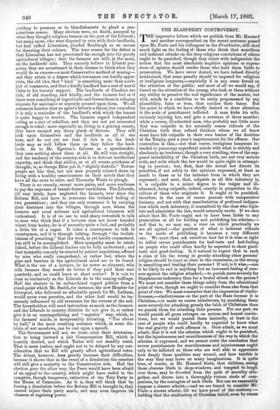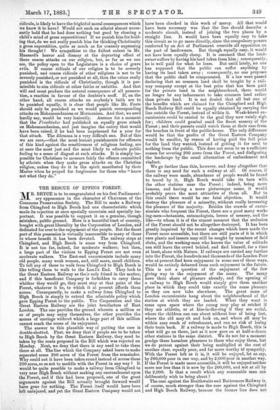THE BLASPHEMY CONTROVERSY.
THE impressive letters which we publish from Mr. Hansard and another correspondent on the recent sentence passed upon Mr. Foote and his colleagues in the Freethinker, will shed much light on the feeling of those who think that scurrilous and indecent attacks on the deep religious convictions of others ought to be punished, though they reject with indignation the notion that the most absolutely negative opinions or expres- sions of opinion should render those who hold them liable to prosecution. We have never denied, we have indeed directly maintained, that some penalty should be imposed for religious or irreligious lampoons,—especially if in any sense forced on the attention of the public ; and most of all we would say, if forced on the attention of the young, who look at them without any ability to perceive the real significance of the matter, but with minds in a condition to be easily prepossessed by any plausibility, false or true, that catches their fancy. But the point to which we have chiefly desired to draw attention is the scale of punishment inflicted. A man kicks his wife, seriously injuring her, and gets a sentence of three months ; while a coarse, ill-educated man, who probably saw little more that was culpable in his naturally coarse ridicule of the Christian faith than refined thinkers whom we all know must have felt culpable in their own banter of the doctrine of the Trinity, gets a year's imprisonment for his offence. Our contention is this,—not that coarse, irreligious lampoons in- tended to preoccupy superficial minds with what is strictly and absolutely an irrelevant, though a very startling, view of the sup- posed incredibility of the Christian faith, are not very serious evils, and evils which the law would be quite right in attempt- ing to prevent ; but, first, that the actual law directs its penalties, if not solely to the opinions expressed, at least as much to these as to the indecent form in which they are expressed ; and next, that, culpable as all this indecency is, it is culpable in a minor degree in the vulgar and ill- educated, being culpable, indeed, exactly in proportion to the culture of those who originate it. It ought to be punished, therefore, in the case of coarse persons with comparative leniency, and not with that manifestation of profound indigna- tion which such indecency, if committed by the class who legis- late and administer the law, would naturally excite. If we once admit that Mr. Foote ought not to have been liable to any prosecution at all for holding and publishing his atheism,— and that is, we may say, a view on which practically we are all agreed,—the question of what is indecent ridicule in the mode of publishing it becomes a very different one. We must then ask ourselves how far it is wise or right to inflict severe punishments for bad-taste and bad-feeling on people who could often hardly be expected to show good- taste and good-feeling. Is it natural to expect that in such a class of life the wrong in grossly attacking other persons' religion should be (say) as clear to the conscience, as the wrong in assaulting and beating their persons ? If not, is it wise,—can it be likely to end in anything but an increased feeling of sore- ness against the religion attacked,—to punish more severely for blasphemous indecency than for a brutal attack on the person? We must not consider these things solely from the educational point of view, though we ought to consider them also from that point of view. We must remember that the impression of vindic- tiveness,—vindictiveness on the part of the State because it is Christian,—is made on coarse unbelievers, by punishing them more severely for attacking grossly the faith of ChEstians than we punish them for attacking their persons. For our part, we would punish all gross outrages on serious and honest convic- tions, but we would punish them leniently, at least in the case of people who could hardly be expected to know what the real gravity of suckoffences is. Once admit, as we must admit, that it is not the atheism which ought to be punished, but the injuriousness and scurrilousness of the way in which the atheism is expressed, and we cannot resist the conclusion that severe punishments for scurrilousness and injuriousness ought only to be inflicted on those who are well able to appreciate how deeply these qualities may wound, and how terrible is the scar they may leave on many imaginations. It is quite true, of course as Mr. Hansard hints, that children, seeing these obscene libels in shop-windows, and tempted to laugh over them, may be diverted from the path of morality alto- gether, and drawn into a thoroughly vicious circle of com- panions, by the contagion of such libels. But can we reasonably suppose a sincere atheist,—and we are bound to consider Mr. Foote a sincere atheist, till we have proof of the contrary,— holding that the eradication of Christian belief, even by coarse
ridicule, is likely to have the frightful moral consequences which we know it to have? Would not such an atheist almost neces- sarily hold that he had done nothing but good by clearing a child's mind of gross superstitions? If we punish him for hold- ing that, do we not really punish him for thinking Christianity a gross superstition, quite as much as for coarsely expressing his thought We sympathise to the fullest extent in Mr. Hansard's horror and dismay at the depraving effect of these coarse attacks on our religion, but, so far as we can see, the policy open to the Legislature is a choice of grave evils. If coarse ridicule of our religion is to be severely punished, and coarse ridicule of other religions is not to be severely punished, or not punished at all, then the crime really punished is the ridicule of Christianity, though it is per- missible to aim ridicule at other faiths or unfaiths. And that will and must produce the natural consequence of all persecu- tion, a reaction in favour of the doubter's scoff. If, on the other hand, all coarse attacks on anybody's faith are to be punished equally, it is clear that people like Mr. Foote should only be punished as we would punish corresponding attacks on Mahommeds.nism or Mormonism. And that, we need hardly say, would be very leniently. Assume for a moment that the Freethinker had published an equally gross attack on Mahommedanism, and just imagine the outcry that would have been raised, if he had been imprisoned for a year for that attack. The dilemma is a very difficult one. But of this we are sure,—that the most lenient punishments for offences of this kind against the sensitiveness of religious feeling, are at once the most just and the most likely to educate public feeling to a sense of disgust at such attacks. It is simply im- possible for Christians to measure fairly the offence committed by atheists when they make gross attacks on the Christian religion, unless they do it in the spirit manifested by their Master when he prayed for forgiveness for those who "know not what they do."



































 Previous page
Previous page